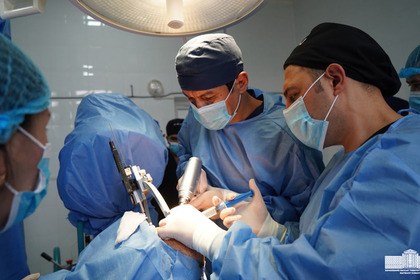Complex minimally invasive surgical treatment of Parkinson’s disease was conducted for the first time in Uzbekistan on December 26 at the Department of Neurosurgery and Clinic of Samarkand State Medical University (SamSMU), the press service of SamSMU said.
63-year-old patient who had suffered from Parkinson's disease for five years was successfully operated on with implanting of a neurostimulator to transmit impulses and stimulate the brain.
Reportedly, the operation was conducted as part of an international scientific and practical seminar and master class with the participation of the lead specialist of the Medical Park clinic (Istanbul, Turkey), Professor Said Öztürk.
After the operation, an agreement was reached between the Department of Neurosurgery of SamSMU and the Medical Park Clinic on the training of personnel for the surgical treatment of Parkinson’s disease at the specialized scientific and practical center for neurosurgery and neurorehabilitation of SamSMU.
Parkinson's disease is a brain disease that impairs physical activity and causes mental disorders, sleep disorders, pain and other health problems, according to the World Health Organization. The most common symptoms of Parkinson's disease include tremors, painful involuntary muscle contractions, and speech problems.
The disease is incurable, but its symptoms can be reduced with various types of therapy and medications. In a large number of cases, Parkinson's disease leads to disability and the need for outside help. Many people with Parkinson's disease also develop dementia.
The disease usually occurs in older people, but can also occur in younger people. It affects men more often than women.
The cause of the disease is not known, but the risk of developing it is higher in people who have relatives with Parkinson's disease. The risk of illness may be increased by air pollution and exposure to pesticides and solvents.
The SamSMU underscored that Parkinson's disease occurs in 1-3 out of every 1000 people (0.1-0.3%) worldwide. Recently, the number of people with this disease has also been increasing in Uzbekistan, the university emphasized.














